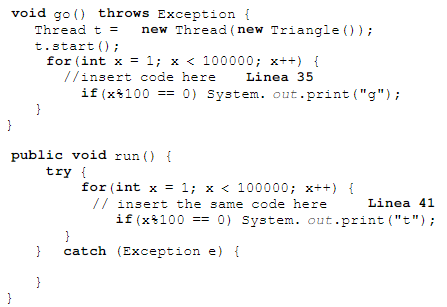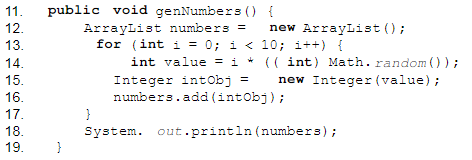Given:
11. public void genNumbers() {
12. ArrayList numbers = new ArrayList();
13. for (int i=0; i<10; i++) {
14. int value = i * ((int) Math.random());
15. Integer intObj = new Integer(value);
16. numbers.add(intObj);
17. }
18. System.out.println(numbers);
19. }
Which line of code marks the earliest point that an object referenced by intObj becomes a candidate for garbage collection?()
Which statements concerning the relationships between the following classes are true?()
class Foo { int num;
Baz comp = new Baz();
}
class Bar { boolean flag;
}
class Baz extends Foo {
Bar thing = new Bar();
double limit;
}
Given the Tag:
Assuming the tag referenced by my Tags: get Advice uses the Classic event model,
which is true?()
Given that Thing is a class, how many objects and reference variables are created by the following code?()
Thing item, stuff;
item = new Thing();
Thing entity = new Thing();
class java {
public static void main(String [] java) {
for (int Java = 1; Java 〈 java.length; Java++)
System.out.print("java ");
}
}
和命令行:
java java java java java
结果为:()
Given:

What, inserted at line 39, will sort the keys in the props HashMap?()
You are trying to recover your database. During the recovery process, you receive the following error:
ORA-00279: change 5033391 generated at 08/17/2008 06:37:40 needed for thread 1ORA-00289: suggestion :
/oracle01/flash_recovery_area/ORCL/archivelog/2008_08_17 /o1_mf_1_11_%u_.arc
ORA-00280: change 5033391 for thread 1 is in sequence #11 ORA-00278: log
file ,,/oracle01/flash_recovery_area/ORCL/archivelog/2008_08_17
/o1_mf_1_10_4bj6wnqm_.arc no longer needed for this recovery Specify log: {
filename
AUTO
CANCEL} ORA-00308: cannot open archived log
,,/oracle01/flash_recovery_area/ORCL/archivelog/2008_08_17 /o1_mf_1_11_%u_.arc
ORA-27037: unable to obtain file status Linux Error: 2: No such file or directory Additional information: 3
How do you respond to this error?()
Given that Triangle implements Runnable, and:

Which two statements, inserted independently at both lines 35 and 41, tend to allow both threads totemporarily pause and allow the other thread to execute?()
Given:

Which line of code marks the earliest point that an object referenced by intObj becomes a candidate for garbage collection?()
Given:
12.Date date = new Date();
13.df.setLocale(Locale.ITALY);
14.String s = df.format(date);
The variable df is an object of type DateFormat that has been initialized in line 11.
What is the result if this code is run on December 14, 2000?()
Given the following RMAN commands,choose the option that reflects the order required to restore your currently operational ARCHIVELOG-mode database.()
a. restore database
b. recover database
c. shutdown immediate
d. startup
e. restore archivelog all
f. alter database open
现有:
class Tree {
private static String tree = "tree ";
String getTree () { return tree; }
}
class Elm extends Tree {
private static String tree = "elm ";
public static void main (String [] args) {
new Elm() .go (new Tree()) ;
}
}
void go (Tree t) {
String s = t.getTree () +Elm.tree + tree + (new Elm() .getTree ()) ;
System.out.println (s) ;}
结果为:()
public class A extends Thread {
A() {
setDaemon(true);
}
public void run() {
(new B()).start();
try {
Thread.sleep(60000);
} catch (InterruptedException x) {}
System.out.println(“A done”);
}
class B extends Thread {
public void run() {
try {
Thread.sleep(60000);
} catch (InterruptedException x) {}
System.out.println(“B done”);
}
}
public static void main(String[] args) {
(new A()).start();
}
}
What is the result?()

Given:
11. public void genNumbers() {
12. ArrayList numbers = new ArrayList();
13. for (int i=0; i<10; i++) {
14. int value = i * ((int) Math.random());
15. Integer intObj = new Integer(value);
16. numbers.add(intObj);
17. }
18. System.out.println(numbers);
19. }
Which line of code marks the earliest point that an object referenced by intObj becomes a candidate for garbage collection?()
11. public void genNumbers() {
12. ArrayList numbers = new ArrayList();
13. for (int i=0; i<10; i++) {
14. int value = i * ((int) Math.random());
15. Integer intObj = new Integer(value);
16. numbers.add(intObj);
17. }
18. System.out.println(numbers);
19. }
Which line of code marks the earliest point that an object referenced by intObj becomes a candidate for garbage collection?()
1. class Pizza {
2. java.util.ArrayList toppings;
3. public final void addTopping(String topping) {
4. toppings.add(topping);
5. }
6. }
7. public class PepperoniPizza extends Pizza {
8. public void addTopping(String topping) {
9. System.out.println(”Cannot add Toppings”);
10. }
11. public static void main(String[] args) {
12. Pizza pizza = new PepperoniPizza();
13. pizza.addTopping(”Mushrooms”);
14. }
15. }
What is the result?()
public class X {
public static void main (String[]args) {
string s = new string (“Hello”);
modify(s);
System.out.printIn(s);
}
public static void modify (String s) {
s += “world!”;
}
}
What is the result?()
分析下列Java代码:
class A {
public static void main(String[] args) {
method(); }
static void method() { try {
System.out.println("Hello"); System.exit(0); }
finally {
System.out.println("good-bye"); } } }
编译运行后,输出结果是()。
Assuming that the serializeBanana2() and the deserializeBanana2() methods will correctly use Java serialization and given:
import java.io.*;
class Food {Food() { System.out.print(”1”); } }
class Fruit extends Food implements Serializable {
Fruit() { System.out.print(”2”); } }
public class Banana2 extends Fruit { int size = 42;
public static void main(String [] args) {
Banana2 b = new Banana2();
b.serializeBanana2(b); // assume correct serialization
b = b.deserializeBanana2(b); // assume correct
System.out.println(” restored “+ b.size + “ “); }
// more Banana2 methods
}
What is the result?()
1. public class SimpleCalc {
2. public int value;
3. public void calculate() { value += 7; }
4. }
And:
1. public class MultiCalc extends SimpleCalc {
2. public void calculate() { value -= 3; }
3. public void calculate(int multiplier) {
4. calculate();
5. super.calculate();
6. value *=multiplier;
7. }
8. public static void main(String[] args) {
9. MultiCalc calculator = new MultiCalc();
10. calculator.calculate(2);
11. System.out.println(”Value is: “+ calculator.value);
12. }
13. }
What is the result?()
What is wrong with the following code?()
class MyException extends Exception {}
public class Qb4ab {
public void foo() { try { bar(); } finally { baz();
} catch (MyException e) {}
}
public void bar() throws MyException {
throw new MyException();
}
public void baz() throws RuntimeException {
throw new RuntimeException();
}
}
现有:
class Birds {
public static void main (String [] args) {
try {
throw new Exception () ;
} catch (Exception e) {
try {
throw new Exception () ;
} catch (Exception e2) { System.out.print ("inner "); }
System. out.print ( "middle" ) ;
}
System.out.print ("outer") ;
}
}
结果是()
Given:
11. static class A {
12. void process() throws Exception { throw new Exception(); }
13. }
14. static class B extends A {
15. void process() { System.out.println("B "); }
16. }
17. public static void main(String[] args) {
18. A a = new B();
19. a.process();
20. }
What is the result? ()
现有:
void topGo() {
try {
middleGo();
} catch (Exception e) {
System.out.print("catch");
}
}
void middleGo() throws Exception {
go();
system.out.print("late middle");
}
void go() throws ExceptiOn {
throw new Exception();
}
如果调用 topGo () ,则结果为:()
11. static class A {
12. void process() throws Exception { throw new Exception(); }
13. }
14. static class B extends A {
15. void process() { System.out.println(”B”); }
16. }
17. public static void main(String[] args) {
18. new B().process();
19. }
What is the result?()
11. static classA {
12. void process() throws Exception { throw new Exception(); }
13. }
14. static class B extends A {
15. void process() { System.out.println(”B “); }
16. }
17. public static void main(String[] args) {
18.A a=new B();
19. a.process();
20.}
What is the result?()
import java.io.IOException;
public class ExceptionTest(
public static void main (Stringargs)
try (
methodA();
) catch (IOException e) (
system.out.printIn(“Caught IOException”);
) catch (Exception e) (
system.out.printIn(“Caught Exception”);
)
)
public void methodA () {
throw new IOException ();
}
What is the result?()
1. class Exc0 extends Exception { }
2. class Exc1 extends Exc0 { }
3. public class Test {
4. public static void main(String args[]) {
5. try {
6. throw new Exc1();
7. } catch (Exc0 e0) {
8. System.out.println(“Ex0 caught”);
9. } catch (Exception e) {
10. System.out.println(“exception caught”);
11. }
12. }
13. }
What is the result?()
现有:
class ThreadExcept implements Runnable {
public void run() { throw new RuntimeException("exception "); }
public static void main(String [] args) {
new Thread(new ThreadExcept()).start();
try {
int x = Integer.parseInt(args[0]);
Thread.sleep(x);
System.out.print("main ");
} catch (Exception e) { }
}
}
和命令行:
java ThreadExcept 1000
哪一个是结果?()
11.classA {
12. public void process() { System.out.print(”A “); } }
13. class B extends A {
14. public void process() throws RuntimeException {
15. super.process();
16. if (true) throw new RuntimeException();
17. System.out.print(“B”); }}
18. public static void main(String[] args) {
19. try { ((A)new B()).process(); }
20. catch (Exception e) { System.out.print(”Exception “); }
21. }
What is the result?()
11.classa {
12. public void process() { System.out.print(”a,”); } }
13. class b extends a {
14. public void process() throws IOException {
15. super.process();
16. System.out.print(”b,”);
17. throw new IOException();
18. } }
19. public static void main(String[] args) {
20. try { new b().process(); }
21. catch (IOException e) { System.out.println(”Exception”); } }
What is the result?()
Class TestException
1. public class TestException extends Exception {
2. } Class a:
1. public class a {
2.
3. public String sayHello(String name) throws TestException {
4.
5. if(name == null) {
6. throw new TestException();
7. }
8.
9. return “Hello “+ name;
10. }
11.
12. }
A programmer wants to use this code in an application:
45. A a=new A();
46. System.out.println(a.sayHello(”John”));
Which two are true?()
Given:
11.String test = "Test A. Test B. Test C.";
12.// insert code here
13.String[] result = test.split(regex);
Which regular expression, inserted at line 12,correctly splits test into "Test A","Test B",and "Test C"?()
免费的网站请分享给朋友吧